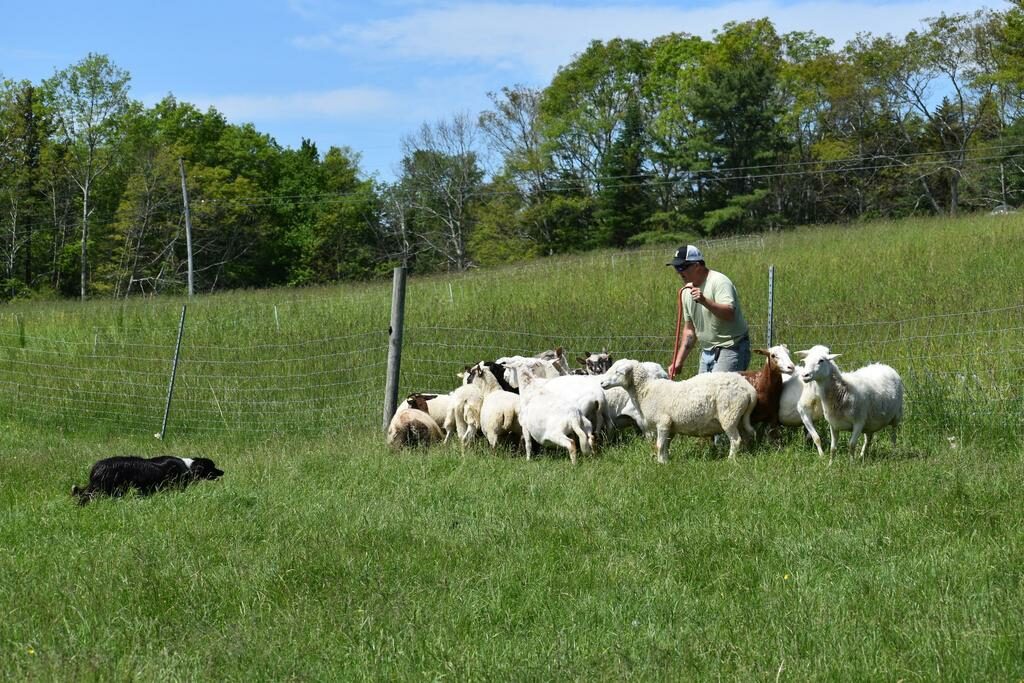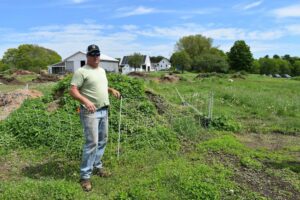
HARPSWELL — Organic farming and herding animals were the demos of the day when visitors gathered at Two Coves Farm on June 15.
Joe and Laura Grady began their careers at Two Coves in April 2009 after spending six years at a small boarding school in New Hampshire. Now they take pride in their organic, pasture-based farm.

“We just got really swept up in the pasture-based livestock idea. I fell in love with moving livestock with dogs and that whole process,” Joe Grady said. “I was a high school teacher for a couple years before I stopped in order to make this work, and we’ve managed to do this for eight years now without any other employment, which we consider a tremendous success.”
Saturday’s demonstration was organized by Friends of Merrymeeting Bay as part of its Summer Outside program. The group covers areas in Sagadahoc, Lincoln and Cumberland counties and focuses on research, mainly with advocacy around migratory fish restoration. It also hosts summer education programs for children; more information can be found at http://friendsofmerrymeetingbay.org.
Grady started the morning with a brief introduction and tour of the farm, where the couple also rent out a yurt and a campsite. He said he bases his philosophy on how animals have successfully turned over pastures naturally and has made it work on his farm. By relocating chicken, sheep and goats periodically, the pastures have a chance to breathe and regrow and allows animals to have a more well-balanced diet because they graze at different locations.
“What we’re trying to do is mimic nature,” Grady said. “When comparing this to the Great Plains, we can look at what built up the soil there. Herds of buffalo would move and travel closely to avoid predators. Then, they would hammer an area, demolish it, eat everything, leave it all behind and come back to it when it was ready again.”
This process is made much easier with the help of a sheep-herding dog. The Gradys’ dog, Nuala, is a 5-year-old border collie that began training at around 7 months old. She was trained with voice commands that instruct her on which directions to move, when to stop, and when she is done herding and can move on.
“Once she’s clicked into motion, that means that she is working. Now, no matter where I go, she is going to do what she needs to keep the sheep with me,” Grady said. This means that no matter where he moves, Nuala will continue to herd the sheep around him without any instruction.
When she’s in motion, Nuala’s attention is focused on keeping the sheep together and moving. Because they were enclosed in a fenced-in pasture, Grady had to prompt her more than he normally would.
“She’s not stupid and she knows there are no big threats here. When you have a young dog, all you’re trying to do is get the dog to the sheep. Not yelling and screaming and giving commands because you don’t have to, you just have to understand what the dog wants to do and then let it do it,” Joe Grady said.
Border collies are well-equipped for herding as they work at a distance, where other breeds are more comfortable staying close to their owners. Grady says if there is a weakness in a dog, it is because of how it was trained.
“Once you get to the point where you understand the dog and what they do, the sky is the limit. They have instincts and they know what to do, you just need to reinforce good behavior and discourage the wrong things. If you can do that, you will have a dog that is bulletproof,” Grady said.
Taylor Abbott can be reached at 780-9123 or tabbott@theforecaster.net. Follow Taylor on Twitter: @tabbotttt.

Comments are no longer available on this story